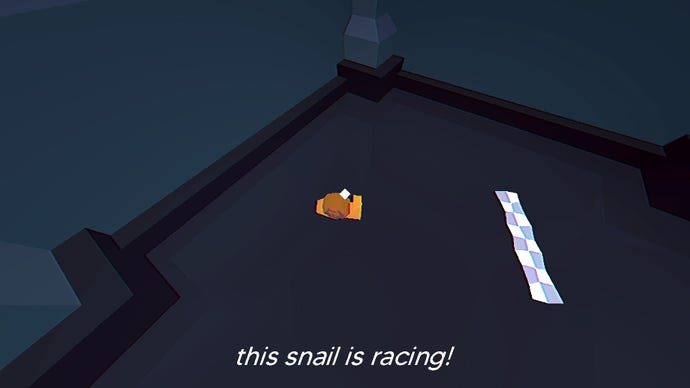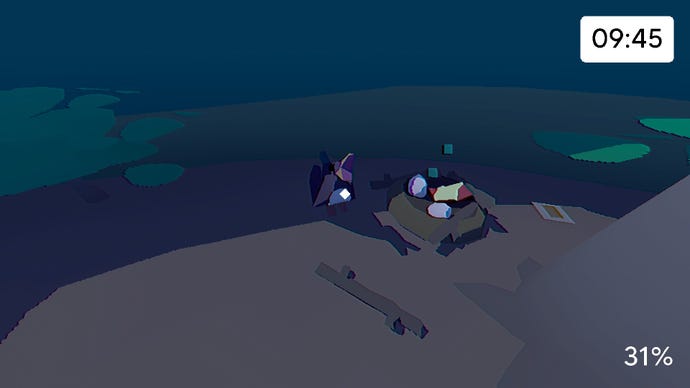As befits a “very normal gardening game,” Grunn’s puzzling mystery box winks at itself, advertising itself as the first tool I acquired was a pair of shears. The second tool I acquired was a trumpet. It doesn’t actually work like a trumpet and does things that no regular trumpet could or should do. Next I have a trowel. Here’s the whole thing about the trowel: it’s a pretty good trowel. Nothing extraordinary. But lately I keep digging out… items. The most peculiar objects. I’ve got the weekend to tidy up the garden and have a cozy little shed to sleep in, so I really should get on with it. But I’ll say it again: I’m constantly digging out… items.
I’m going to immaculate up some trash from the bathroom. I interact with the mirror and the game says, “You can’t see anything in the mirror.” I take the note that says: I can’t see anything in the mirror. I check the game again and no, I still don’t see anything in the mirror. Of course it’s okay. Probably just a shitty mirror. They should replace it. What’s the point of a mirror in which you can’t see anything?
Hilariously unnerving and gleefully disorienting, Grunn is the equivalent of taking a lovely nap in a rocking chair handmade by a wizened, twinkling-eyed carpenter and then being woken up by a pulsating anomaly in the space between the walls. It lasts two days and you need to spend your time wisely if you want to be the best gardener you can be and make it out alive.
The first inkling that something is wrong in Grunn is a plank falling at a too-perfect moment from the bridge you cross to get to the garden. Everything’s fine, I thought. That’s where I came from anyway, and I have to work in the garden. We will cross This bridge when we get to it, I thought, and then congratulated myself on my joke. I found the shed where I would sleep for the next few nights, grabbed the shears, and found the list from the owner.
Cut the grass. Trim your hedges. Aquatic plants. Collect garbage. Get rid of molehills. Easy enough. You can move really speedy if you hold down the shift key, and you can also work your scissors like crazy if you hold down the mouse button, so I spent a lot of really cheerful time jumping back and forth around the garden, rampaging through the garden with the overgrown grass. I am still deeply in love with the sound of scissors. It’s a bit like a pair of unreasonably resonant safety scissors. I’m also delighted with how excellent the default sensitivity of the Grunn mouse is. The grass never stood a chance.
Before crossing the bridge, you find your first Polaroid photo of where the gate key is, and that’s basically your tutorial to keep an eye out for more. The puzzles in Grunn aren’t really about deduction or solving anything in the customary sense, although some of them are reminiscent of classic adventure game puzzles. It’s less lock and key, more tearing out layers of wrapping paper from a massive, non-Euclidean shipment. Except some layers take you away from the center, some take you back to where you were before, and some have your hands cut off.

The games I was mentally comparing it to, oddly enough, were Deathloop and Outer Wilds. Remember that there is no explicit time loop, but you do keep Polaroids between games. More importantly, you retain knowledge of how the strange places you discover fit together and when to get certain items so you don’t die horribly. And here’s another thing: Grunn is getting bigger and bigger. The game world changes from day to day, and sometimes hour to hour. You will begin to create a mental checklist of places to visit first and at specific times and days. Throughout, the game maintains more of a tug-of-war between fear and fantasy.
There is a gnome in the garden, and there may be more later. Although I have a passing interest in the strange idiosyncrasies of the folklore canon, time and circumstances have made ornaments readily available, available in any B&Q. Gnomes. Fortune tellers. Gargoyles. Mushrooms. Grunn draws much of his inspiration from what we might call horticultural knowledge; the enormous universe of the hedge. It plays up the comforting strangeness evoked by the garden’s interstitial role as both an extension of the house and a curated wildlife in miniature.
My grandfather was an incredibly practical guy. Only read non-fiction. He held a pencil behind his ear. But as he looked out at his garden, his face took on a distant, dreamy expression. Grunn is, in a way, a celebration of the same things that I think Tolkien evoked in his depiction of the Shire: even the best-tended gardens feel like gateways to something distant and magical. The spaces between worlds and the way we decorate them take this into account.

But Grunn is also very dim, silly and witty not only in what it shows, but also in how it affects the player’s experience. Apparently you are very adept at picking up trash, and this is how you immaculate up the entire street and the outside of the gas station. You feel compelled to make this diminutive town tidier, and you feel like Grunn is sniggering at you for throwing crumpled packs of cigarettes into the trash can when you should be working on not being scared to death. There’s also this feeling of being incredibly isolated from all the characters you meet because they speak a language you don’t understand, but at the same time it takes on a lovely toy town feel. Very cozy, European purgatory.
Is Grunn for you? Well, do you like the feeling of doing things that used to take you a long time, again, but really quickly? Do you like strange and delightful discoveries? Do you like saying “ah!” really deafening as the mystery comes together? Do you like dying in different ways and unlocking novel endings, and knowing that you can do things differently next time? Do you like knowing how many coins you have collected? In fact, Grunn won’t tell you this unless you pick up another coin. It’s annoying, Grunn. Please sort this out. Otherwise: Grunnderful stuff. Gnome’s Notes. Bury.
This review is based on the version of the review provided by the developer.

